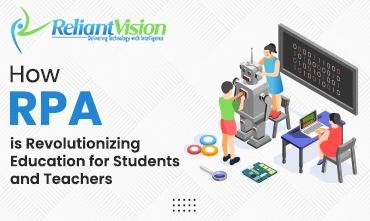In today’s rapidly evolving world, the future of learning has taken an exciting turn with the advent of Robotic Process Automation (RPA). This cutting-edge technology is revolutionizing education for both students and teachers, offering a myriad of possibilities for improved efficiency, personalized learning experiences, and enhanced collaboration. With RPA, tedious administrative tasks can be automated, freeing up valuable time for educators to focus on what truly matters: inspiring and guiding their students. Moreover, students are empowered with interactive and immersive learning experiences, tailored to their individual needs and learning styles. From virtual classrooms to automated grading systems, RPA is reshaping the educational landscape, bringing forth a new era of innovation and engagement. Get ready to embrace the future of learning with RPA!
How RPA is transforming the learning experience
RPA is transforming the learning experience by providing innovative solutions that enhance engagement, personalization, and accessibility. One of the key ways RPA is transforming learning is through the use of virtual classrooms. With RPA, students can participate in immersive online learning environments, complete with interactive simulations, virtual experiments, and collaborative projects. This not only makes learning more engaging but also allows students to learn at their own pace, regardless of their physical location or time zone.
Additionally, RPA is revolutionizing the way educational content is delivered. Traditional textbooks are being replaced by interactive e-books and multimedia resources that cater to diverse learning styles. RPA-powered platforms can analyze student performance data and provide personalized recommendations for further learning, ensuring that each student receives an individualized education plan that maximizes their potential. The use of adaptive learning algorithms allows students to progress at their own pace, reinforcing concepts they struggle with while accelerating through material they grasp quickly.
Moreover, RPA is enabling seamless collaboration between students and teachers. Through online platforms and tools, students can easily submit assignments, receive feedback, and engage in discussions with their peers and instructors. This fosters a sense of community and encourages active participation, even in virtual learning environments. With RPA automating administrative tasks such as attendance tracking and grading, educators have more time to provide meaningful feedback and guidance to their students, enhancing the quality of the learning experience.
Benefits of using RPA in education
The benefits of using RPA in education are vast and impactful. First and foremost, RPA improves efficiency by automating repetitive and time-consuming administrative tasks. From managing student records to generating reports, RPA streamlines these processes, reducing the burden on educators and freeing up valuable time that can be better spent on teaching and mentoring.
Furthermore, RPA enhances the accuracy and consistency of student assessments and grading. Automated grading systems powered by RPA can quickly and accurately evaluate assignments, quizzes, and exams, ensuring fairness and objectivity. This not only saves time for educators but also provides students with prompt feedback, allowing them to identify areas for improvement and track their progress more effectively.
Another significant benefit of RPA in education is the ability to personalize learning experiences. With RPA, learning can be tailored to the individual needs, preferences, and learning styles of each student. Adaptive learning algorithms analyze student performance data and provide personalized recommendations for further study, ensuring that students receive the support and resources they need to succeed. This personalized approach to education promotes student engagement and motivation, leading to better learning outcomes.
Additionally, RPA enhances accessibility in education. By providing virtual learning environments and online resources, RPA enables students to access education regardless of their physical location or circumstances. This is particularly beneficial for students with disabilities or those living in remote areas where access to quality education may be limited. RPA ensures that all students have equal opportunities to learn and succeed.
The future of RPA in educationThe future of RPA in education is promising, with continued advancements and innovations on the horizon. As technology continues to evolve, RPA will become more sophisticated, enabling even greater automation and personalization in education. Virtual reality (VR) and augmented reality (AR) technologies, combined with RPA, will create immersive and interactive learning experiences that simulate real-world scenarios and enhance student engagement.
Additionally, the integration of artificial intelligence (AI) with RPA will enable intelligent automation, where RPA systems can learn from data and make informed decisions. This will further enhance the personalized learning experience, as AI-powered algorithms can adapt to individual student needs and preferences in real time.
Moreover, the use of chatbots powered by RPA will provide instant support and guidance to students, answering their questions and addressing their concerns. Chatbots can be integrated into virtual classrooms and learning platforms, creating a seamless and personalized learning experience.
Furthermore, RPA has the potential to facilitate lifelong learning, enabling individuals to acquire new skills and knowledge throughout their lives. By providing personalized learning paths and resources, RPA can support individuals in their continuous learning journeys, allowing them to adapt to the changing demands of the workforce and society.
Final words
RPA is revolutionizing education by transforming the learning experience for students and teachers. From virtual classrooms to automated grading systems, RPA offers a range of possibilities for improved efficiency, personalized learning experiences, and enhanced collaboration. The benefits of using RPA in education are vast, including improved efficiency, personalized learning, enhanced accessibility, and streamlined administrative tasks. While there are challenges and considerations in implementing RPA, successful case studies demonstrate its transformative impact. The future of RPA in education is bright, with advancements in technology and the integration of AI and VR/AR promising even greater automation and personalization.

